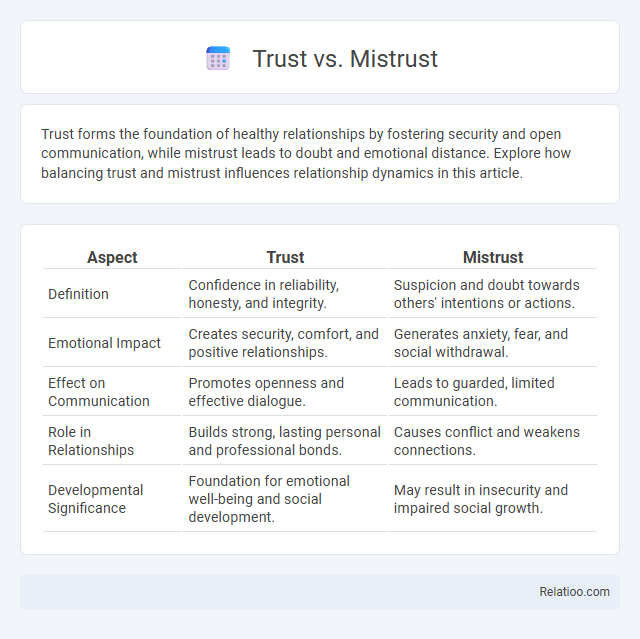Trust forms the foundation of healthy relationships by fostering security and open communication, while mistrust leads to doubt and emotional distance. Explore how balancing trust and mistrust influences relationship dynamics in this article.
Table of Comparison
| Aspect | Trust | Mistrust |
|---|---|---|
| Definition | Confidence in reliability, honesty, and integrity. | Suspicion and doubt towards others' intentions or actions. |
| Emotional Impact | Creates security, comfort, and positive relationships. | Generates anxiety, fear, and social withdrawal. |
| Effect on Communication | Promotes openness and effective dialogue. | Leads to guarded, limited communication. |
| Role in Relationships | Builds strong, lasting personal and professional bonds. | Causes conflict and weakens connections. |
| Developmental Significance | Foundation for emotional well-being and social development. | May result in insecurity and impaired social growth. |
Understanding Trust vs Mistrust: Core Definitions
Trust refers to the firm belief in the reliability, truth, or ability of someone or something, rooted in positive past experiences and consistent behavior. Mistrust arises from doubts or perceptions of unreliability, often due to inconsistent actions or negative outcomes that erode confidence. Suspicion involves a cautious or wary attitude, anticipating potential harm or deceit, which serves as a protective mechanism but can hinder the development of full trust.
The Origins of Trust and Mistrust in Human Development
The origins of trust and mistrust in human development emerge primarily during infancy as outlined by Erik Erikson's first psychosocial stage, where consistent caregiving fosters a foundational sense of security and trust. Neural pathways related to emotional regulation and social cognition are shaped through early interactions with caregivers, influencing attachment styles and the ability to form healthy relationships. Disruptions or inconsistencies in these early bonds often lead to suspicion and insecurity, impacting lifelong interpersonal dynamics and psychological resilience.
Key Psychological Theories Explaining Trust vs Mistrust
Erik Erikson's psychosocial theory identifies Trust vs Mistrust as the foundational stage of personality development, where infants learn to trust their caregivers, shaping future relational patterns. Bowlby's attachment theory explains how secure attachment fosters trust through consistent and responsive caregiving, while inconsistent care leads to mistrust and emotional insecurity. Your ability to build trusting relationships is deeply influenced by these early psychological processes that form the basis for interpreting others' intentions and managing suspicion in social interactions.
Impact of Early Childhood Experiences on Trust Formation
Early childhood experiences significantly influence the development of trust, where consistent and responsive caregiving fosters a fundamental sense of security and reliability. Failure to receive nurturing interactions may lead to mistrust, resulting in emotional guardedness and difficulty forming relationships. Persistent exposure to unpredictable or harmful environments can escalate mistrust into suspicion, impacting social connections and emotional well-being throughout life.
Trust vs Mistrust in Personal Relationships
Trust vs Mistrust in personal relationships forms the foundational stage of emotional development, where individuals learn to perceive others as reliable and supportive or as unpredictable and unsafe. Successfully establishing trust fosters secure attachments, promoting emotional resilience and healthy interpersonal connections throughout life. Persistent mistrust, however, can lead to suspicion, undermining relationship stability and increasing vulnerability to conflict and isolation.
Trust and Mistrust in the Workplace: Effects on Productivity
Trust in the workplace fosters open communication, collaboration, and employee engagement, leading to increased productivity and overall job satisfaction. Mistrust, on the other hand, creates a toxic environment marked by fear, reduced cooperation, and higher turnover rates, which negatively impacts organizational performance. Building trust through transparency, consistent leadership, and employee recognition is crucial for sustaining a productive and innovative workforce.
Social and Cultural Influences on Trust Development
Social and cultural influences profoundly shape the development of trust, mistrust, and suspicion by embedding values, norms, and interpersonal expectations within communities. In collectivist cultures, trust often depends on group cohesion and shared experiences, while individualistic societies emphasize personal reliability and transparency. Early socialization practices, family dynamics, and cultural narratives significantly influence an individual's predisposition to trust or suspicion in relationships.
Signs and Consequences of Chronic Mistrust
Chronic mistrust often manifests as persistent skepticism, difficulty forming close relationships, and heightened anxiety in social situations. You may experience increased isolation, reduced collaboration, and impaired emotional well-being as a result of ongoing suspicion. Long-term consequences include diminished social support, elevated stress levels, and potential development of mental health disorders such as paranoia or depression.
Strategies to Cultivate Trust and Overcome Mistrust
Building Trust requires consistent honesty, clear communication, and reliability in your actions to create a strong foundation in relationships. Overcoming mistrust involves actively listening, addressing concerns transparently, and demonstrating empathy to rebuild confidence. Your commitment to practicing patience and understanding can transform suspicion into mutual respect and secure connections.
Trust vs Mistrust: Long-Term Effects on Mental Health
Trust vs mistrust, a crucial stage in early development identified by Erik Erikson, profoundly influences your long-term mental health by establishing foundational expectations about safety and reliability in relationships. Secure attachment formed through consistent caregiving fosters resilience, emotional stability, and positive social interactions, whereas failure to develop trust can lead to chronic anxiety, difficulty in forming relationships, and susceptibility to mental health disorders such as depression. This early psychosocial conflict shapes an individual's ability to navigate future challenges, affecting self-esteem and emotional regulation throughout life.

Infographic: Trust vs Mistrust
 relatioo.com
relatioo.com